|
Library Bulletins |
|
- Home > Library Bulletins > Recent Addition, February-March 2018
|

Recent Addition, February-March 2018| 1. India's ocean: can China and India coexist? / Zhu, Cuiping - London: Springer, 2018 | 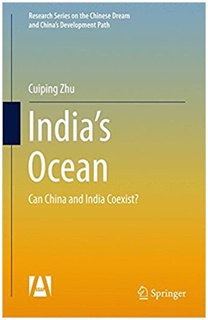 Abstract: The book focuses on analyzing the turbulent situation in the Indian Ocean from the political, economic and security perspectives. It discusses topics ranging from the major powers’ great game in the Indo-Pacific and China’s countermeasures, to China and India’s reciprocal demands and potential conflicts in the Indian Ocean. It also addresses the relations between the Indian Ocean region and China’s economic security and provides an in-depth analysis of the prospects of the 21st Century Maritime Silk Road. Abstract: The book focuses on analyzing the turbulent situation in the Indian Ocean from the political, economic and security perspectives. It discusses topics ranging from the major powers’ great game in the Indo-Pacific and China’s countermeasures, to China and India’s reciprocal demands and potential conflicts in the Indian Ocean. It also addresses the relations between the Indian Ocean region and China’s economic security and provides an in-depth analysis of the prospects of the 21st Century Maritime Silk Road.
| 2. International relations and Asia's northern tier: sino-Russia relations, North Korea, and mongolia / Rozman, Gilbert Ed. and Radchenko, Sergey - New York: Palgarve Macmillan, 2018 |  Abstract: In this new book, noted scholars of Northeast Asia contribute new views on the future of the region. Collecting essays from experts of all 4 countries and their interconnected histories and political orders, the book helps to contextualize the future development of the region in the context of a US "Pivot to Asia." The four countries on the northern fringe of Asia went their separate ways after the end of the Cold War, but strengthening Sino-Russian relations and what may be the looming endgame in North Korea’s strategy of threats and isolation are signs that we now need to think about this area also through its connections. Looking back to what existed in an earlier incarnation of the Northern Tier and focusing on Chinese and Russian views of North Korea, we are able to explore the implications of increasingly close Sino-Russian relations. Abstract: In this new book, noted scholars of Northeast Asia contribute new views on the future of the region. Collecting essays from experts of all 4 countries and their interconnected histories and political orders, the book helps to contextualize the future development of the region in the context of a US "Pivot to Asia." The four countries on the northern fringe of Asia went their separate ways after the end of the Cold War, but strengthening Sino-Russian relations and what may be the looming endgame in North Korea’s strategy of threats and isolation are signs that we now need to think about this area also through its connections. Looking back to what existed in an earlier incarnation of the Northern Tier and focusing on Chinese and Russian views of North Korea, we are able to explore the implications of increasingly close Sino-Russian relations.
| 3. International security in the Asia-Pacific: transcending ASEAN towards transitional polycentrism / Chong, Alan Ed. - New York: Palgarve Macmillan, 2018 |  Abstract: This volume argues that international security in the Asia-Pacific lends itself to contradictory analyses of centrifugal and centripetal trends. Transitional polycentrism is intrinsically awkward as a description of the security of states and their populations; it implies the loosening of state control and the emergence of newly asserted authority by mixed constellations of intergovernmental organizations and non-state actors. It implies a competition of agendas: threats to the integrity of borders and human security threats such as natural disasters, airliner crashes, and displacement by man-made pollution and food scarcity. Conversely, polycentrism could also imply a return to a more neo-realist oriented international order where great powers ignore ASEAN and steer regional order according to their perceived interests and relative military superiority Abstract: This volume argues that international security in the Asia-Pacific lends itself to contradictory analyses of centrifugal and centripetal trends. Transitional polycentrism is intrinsically awkward as a description of the security of states and their populations; it implies the loosening of state control and the emergence of newly asserted authority by mixed constellations of intergovernmental organizations and non-state actors. It implies a competition of agendas: threats to the integrity of borders and human security threats such as natural disasters, airliner crashes, and displacement by man-made pollution and food scarcity. Conversely, polycentrism could also imply a return to a more neo-realist oriented international order where great powers ignore ASEAN and steer regional order according to their perceived interests and relative military superiority
| 4. The Iran nuclear deal: bombs, bureaucrats, and billionaires / Jett, Dennis C.
- New York: Palgarve Macmillan, 2018 |  Abstract: This book examines attempts to influence the outcome of the negotiations between Iran and the United States over Iran’s nuclear capabilities. In particular, it focuses on struggles within the United States around public and congressional opinion with regard to the accord. Trying to prevent a successful outcome to the talks became a cottage industry in Washington, with the casino billionaire Sheldon Adelson being just one of those who were pouring millions of dollars into the effort. On the pro-diplomacy side, there were a wide range of religious, peace, and arms control groups with some financial support coming from the Ploughshares Fund trying to create the space for a negotiated agreement. Abstract: This book examines attempts to influence the outcome of the negotiations between Iran and the United States over Iran’s nuclear capabilities. In particular, it focuses on struggles within the United States around public and congressional opinion with regard to the accord. Trying to prevent a successful outcome to the talks became a cottage industry in Washington, with the casino billionaire Sheldon Adelson being just one of those who were pouring millions of dollars into the effort. On the pro-diplomacy side, there were a wide range of religious, peace, and arms control groups with some financial support coming from the Ploughshares Fund trying to create the space for a negotiated agreement.
| 5. Israel under siege: the politics of insecurity and the rise of the Israeli neo-revisionist right / Sarto, Raffaella A. Del - Washington, D.C.: Geogetown University Press, 2017 |  Abstract: The author examines the creation of Israel's neo-revisionist consensus about security threats and regional order, which took hold of Israeli politics and society after 2000 and persists today. The failed Oslo peace process and the trauma of the Second Palestinian Intifada triggered this shift to the right; conflicts with Hamas and Hezbollah and the inflammatory rhetoric of Iranian President Ahmadinejad additionally contributed to the creation of a general sense of being under siege. While Israel faces real security threats, Israeli governments have engaged in the politics of insecurity, promoting and amplifying a sense of besiegement. Lively political debate has been replaced by a general acceptance of the no-compromise approach to security and the Palestinians. The neo-revisionist right, represented by Benjamin Netanyahu and the Likud, has turned Israel away from the peace process and pushes maximalist territorial ambitions. Abstract: The author examines the creation of Israel's neo-revisionist consensus about security threats and regional order, which took hold of Israeli politics and society after 2000 and persists today. The failed Oslo peace process and the trauma of the Second Palestinian Intifada triggered this shift to the right; conflicts with Hamas and Hezbollah and the inflammatory rhetoric of Iranian President Ahmadinejad additionally contributed to the creation of a general sense of being under siege. While Israel faces real security threats, Israeli governments have engaged in the politics of insecurity, promoting and amplifying a sense of besiegement. Lively political debate has been replaced by a general acceptance of the no-compromise approach to security and the Palestinians. The neo-revisionist right, represented by Benjamin Netanyahu and the Likud, has turned Israel away from the peace process and pushes maximalist territorial ambitions.
| 6. Imagining Pakistan: modernism, state, and the politics of Islamic revival / Rais, Rasul Bakhash Rasul Bakhash Rais - London: Lexington Books, 2017 |  Abstract: Imagining Pakistan argues that the creation of Pakistan is a result of Muslim modernism in the Subcontinent, as it defined the struggle for identity, nationalism, and empowerment of Muslim communities. This modernist movement represented the ideals of inclusivity, equal rights, a liberal constitutional framework, and a shared sense of political community among diverse ethnic and regional groups. However, while this modernity was the ideal of Pakistan's founders, it faced resistance from Islamists obsessed with recovering a past legacy of lost Muslim glory. A major threat to political modernism also came from the military that wanted to create a strong and secure Pakistan through 'controlled' democracy. Multiple interventions by the military and deviations from the foundational republican ideas left Pakistan in the rough sea of power struggles, causing institutional decay and creating space for the rise of radical Islam. Imagining Pakistan analyzes the institutional imbalance between the military and the civilian groups, the idea of the security state, and the Islamist social forces and movements that have been engaged in the politics of Islamic revival. Abstract: Imagining Pakistan argues that the creation of Pakistan is a result of Muslim modernism in the Subcontinent, as it defined the struggle for identity, nationalism, and empowerment of Muslim communities. This modernist movement represented the ideals of inclusivity, equal rights, a liberal constitutional framework, and a shared sense of political community among diverse ethnic and regional groups. However, while this modernity was the ideal of Pakistan's founders, it faced resistance from Islamists obsessed with recovering a past legacy of lost Muslim glory. A major threat to political modernism also came from the military that wanted to create a strong and secure Pakistan through 'controlled' democracy. Multiple interventions by the military and deviations from the foundational republican ideas left Pakistan in the rough sea of power struggles, causing institutional decay and creating space for the rise of radical Islam. Imagining Pakistan analyzes the institutional imbalance between the military and the civilian groups, the idea of the security state, and the Islamist social forces and movements that have been engaged in the politics of Islamic revival.
| 7. Jihad and dawah: evolving narratives of Lashkar-e-Taiba abd Jamat ud Dawah / Yashmeen, Samina - London: Hurst &Company, 2017 | 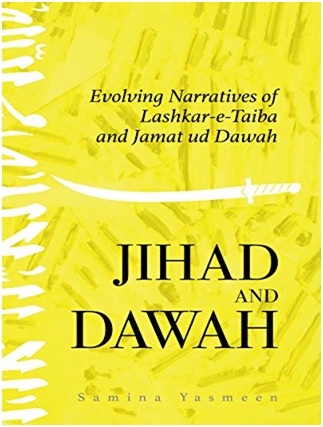 Abstract: This book provides a detailed account of the emergence and metamorphoses of Lashkar-e-Taiba (LeT) and its political arm, Jamat ud Dawah, since the early 1990s. Linking the group's narratives to the process of Islamization in Pakistan and divergent views on the country's Islamic identity, it is the first systematic analysis of how the organization, globally reviled as the perpetrator of the 2008 Mumbai Bombings, has developed its conception of da'wah (proselytizing) and jihad in response to regional and global developments. Abstract: This book provides a detailed account of the emergence and metamorphoses of Lashkar-e-Taiba (LeT) and its political arm, Jamat ud Dawah, since the early 1990s. Linking the group's narratives to the process of Islamization in Pakistan and divergent views on the country's Islamic identity, it is the first systematic analysis of how the organization, globally reviled as the perpetrator of the 2008 Mumbai Bombings, has developed its conception of da'wah (proselytizing) and jihad in response to regional and global developments.
| 8. Jihad &Co.: black markets and Islamist power / Ahmad, Aisha - New Delhi: Oxford University Press, 2017 |  Abstract: The rise of militant jihadist groups is one of the greatest international security crises in the world today. In civil wars across the modern Muslim world, Islamist groups have emerged out of the ashes, surged dramatically to power, and routed their rivals on the battlefield. From North Africa to the Middle East to South Asia, these jihadist groups have seized large swaths of territory and consolidated political control over disparate ethnic and tribal communities. Out of the most broken and ungovernable places on earth, they have built radical new jihadist proto-states out of enduring anarchy. Abstract: The rise of militant jihadist groups is one of the greatest international security crises in the world today. In civil wars across the modern Muslim world, Islamist groups have emerged out of the ashes, surged dramatically to power, and routed their rivals on the battlefield. From North Africa to the Middle East to South Asia, these jihadist groups have seized large swaths of territory and consolidated political control over disparate ethnic and tribal communities. Out of the most broken and ungovernable places on earth, they have built radical new jihadist proto-states out of enduring anarchy.
| 9. Kashmir: history, politics, representation / Zutsh, Chitralekha Ed. - New York: Cambridge University Press, 2018 |  Abstract: On the seventieth anniversary of Indian independence, Partition, and the creation of Pakistan, this ground breaking collection brings together fourteen cutting-edge scholarly essays on multiple aspects of both the region and the issue of Kashmir. While keeping the political dimensions of the dispute over the territory in focus, these innovative essays branch out from the high politics of the conflict to consider less well-known aspects and areas of Kashmir. They examine the continuities and ruptures between Kashmir's past and its present situation; reevaluate the contemporary political scenario from the perspective of gender, economic and political marginality, everyday experiences, and governance; and analyze the ways in which the region of Kashmir and its people are represented and (re)present themselves in films and literature through their regional and religious identities, and commodities. Abstract: On the seventieth anniversary of Indian independence, Partition, and the creation of Pakistan, this ground breaking collection brings together fourteen cutting-edge scholarly essays on multiple aspects of both the region and the issue of Kashmir. While keeping the political dimensions of the dispute over the territory in focus, these innovative essays branch out from the high politics of the conflict to consider less well-known aspects and areas of Kashmir. They examine the continuities and ruptures between Kashmir's past and its present situation; reevaluate the contemporary political scenario from the perspective of gender, economic and political marginality, everyday experiences, and governance; and analyze the ways in which the region of Kashmir and its people are represented and (re)present themselves in films and literature through their regional and religious identities, and commodities.
| 10. Korea-China relations in history and contemporary implications / Chan, Robert Kong - New York: Palgarve Macmillan, 2018 | 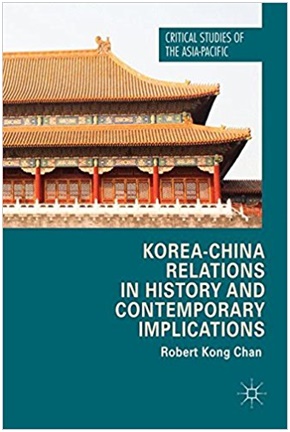 Abstract: This book examines the complex relations between Joseon Korea (1392–1910) and Ming/Qing China in history, and reveals their contemporary implications for the nature of a China-dominated order in East Asia and the relations between China and the middle powers in the region. Instead of relying on the works that offer over-generalized conclusions based on information drawn from secondary sources, this book provides a much more nuanced account of the Koreans’ experience of managing their relations with the great powers by analyzing the first-hand evidence documented by the Joseon historiographers related to the major events in Joseon–Ming relations, Joseon’s response to power transition from Ming to Qing, and Joseon–Qing relations. Abstract: This book examines the complex relations between Joseon Korea (1392–1910) and Ming/Qing China in history, and reveals their contemporary implications for the nature of a China-dominated order in East Asia and the relations between China and the middle powers in the region. Instead of relying on the works that offer over-generalized conclusions based on information drawn from secondary sources, this book provides a much more nuanced account of the Koreans’ experience of managing their relations with the great powers by analyzing the first-hand evidence documented by the Joseon historiographers related to the major events in Joseon–Ming relations, Joseon’s response to power transition from Ming to Qing, and Joseon–Qing relations.
| 11. Migration, cross-border trade and development in Africa: exploring the role of non-state actors in the SADC region / Nshimbi, Christopher Changwe Ed. and Moyo, Inocent - New York: Palgarve Macmillan, 2017 | 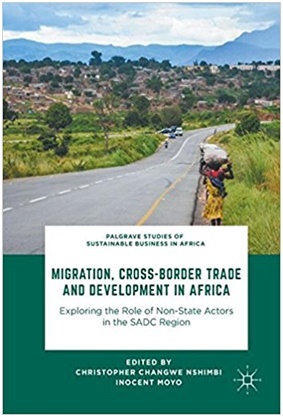 Abstract: Based on migration dynamics in the Southern African Development Community (SADC) region, this edited volume focuses on the activities of grassroots and informal non-state actors. The authors explore cross-border economic activities, migration governance issues, the regional integration project of the SADC, and implications for sustainable development in Africa. Examining the apparent success of immigrant entrepreneurs operating in cities of economically depressed countries such as Zimbabwe, it also discusses the role of local authorities in managing migration to achieve development. Abstract: Based on migration dynamics in the Southern African Development Community (SADC) region, this edited volume focuses on the activities of grassroots and informal non-state actors. The authors explore cross-border economic activities, migration governance issues, the regional integration project of the SADC, and implications for sustainable development in Africa. Examining the apparent success of immigrant entrepreneurs operating in cities of economically depressed countries such as Zimbabwe, it also discusses the role of local authorities in managing migration to achieve development.
| 12. My Enemy's enemy: India in Afghanistan from the soviet invasion to the US withdrawal / Paliwal, Avinash - London: Hurst &Company, 2017 |  Abstract: A definitive account, grounded in history, of the strategic axis between New Delhi and Kabul. The archetype of 'my enemy's enemy is my friend', India's political and economic presence in Afghanistan is often viewed as a Machiavellian ploy aimed against Pakistan. The first of its kind, this book interrogates that simplistic yet powerful geopolitical narrative and asks what truly drives India's Afghanistan policy. My Enemy's Enemy provides a comprehensive analysis of India's strategy debates and foreign policymaking processes vis-a-vis Afghanistan, from the last decade of the Cold War to the 1990s Afghan civil war and the more recent US-led war on terror. It demonstrates that Indian presence in Afghanistan has been guided primarily by an enduring vision for the region that requires a stable balance of power across the Durand Line. Abstract: A definitive account, grounded in history, of the strategic axis between New Delhi and Kabul. The archetype of 'my enemy's enemy is my friend', India's political and economic presence in Afghanistan is often viewed as a Machiavellian ploy aimed against Pakistan. The first of its kind, this book interrogates that simplistic yet powerful geopolitical narrative and asks what truly drives India's Afghanistan policy. My Enemy's Enemy provides a comprehensive analysis of India's strategy debates and foreign policymaking processes vis-a-vis Afghanistan, from the last decade of the Cold War to the 1990s Afghan civil war and the more recent US-led war on terror. It demonstrates that Indian presence in Afghanistan has been guided primarily by an enduring vision for the region that requires a stable balance of power across the Durand Line.
| 13. North Korea, Iran, and the challenge to international order / McEachern, Patrick and MaEachern, Jaclyn O'Brien - London: Routledge, 2018 | 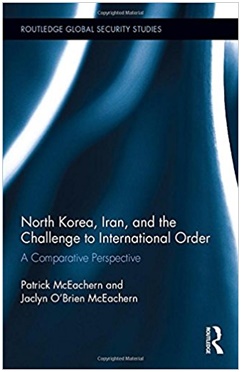 Abstract: This book examines and compares the political situations in North Korea and Iran, and the contemporary security challenges posed by their illicit nuclear aspirations. Abstract: This book examines and compares the political situations in North Korea and Iran, and the contemporary security challenges posed by their illicit nuclear aspirations.
While government officials, including a series of American presidents, strategic policy documents and outside analysts have repeatedly noted that North Korea and Iran occupy a similar challenge, the commonality has largely been left unexplored. This book argues that North Korea and Iran are uniquely common in the world today in their illicit nuclear aspirations in violation of their legal commitments made under the Non-Proliferation Treaty. The work evaluates alternative arguments, some of which sustain that the two states should be grouped together based on other metrics, such as nuclear powers that sponsor terrorist organizations or nuclear states that violate human rights, and find alternative explanations do not hold up to empirical scrutiny.
| 14. Neighbours in Arms: an American senator's quest for disarmament in a nuclear subcontinet / Pressler, Larry Larry Pressler - Gurgaon: Penguin Books, 2017 | 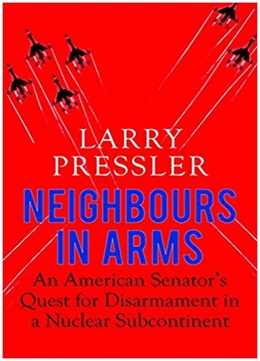 Abstract: As chairman of the US Senate's Arms Control Subcommittee, Larry Pressler advocated the now-famous Pressler Amendment, enforced in 1990 when President George H.W. Bush could not certify that Pakistan was not developing a nuclear weapon. Aid and military sales to Pakistan were blocked, including a consignment of F-16 fighter aircraft, changing forever the tenor of the United States' relationships with Pakistan and India and making Pressler 'a temporary hero throughout India and a devil in Pakistan'. This book reveals what went on behind the scenes in the years when the Pressler Amendment was in force, through a cast of characters that include presidents, prime ministers, senators and generals in the US, India and Pakistan. It exposes the enormous power wielded by the military-industrial complex, which the author terms 'Octopus' and how it controls significant aspects of the American presence in the Indian subcontinent. Abstract: As chairman of the US Senate's Arms Control Subcommittee, Larry Pressler advocated the now-famous Pressler Amendment, enforced in 1990 when President George H.W. Bush could not certify that Pakistan was not developing a nuclear weapon. Aid and military sales to Pakistan were blocked, including a consignment of F-16 fighter aircraft, changing forever the tenor of the United States' relationships with Pakistan and India and making Pressler 'a temporary hero throughout India and a devil in Pakistan'. This book reveals what went on behind the scenes in the years when the Pressler Amendment was in force, through a cast of characters that include presidents, prime ministers, senators and generals in the US, India and Pakistan. It exposes the enormous power wielded by the military-industrial complex, which the author terms 'Octopus' and how it controls significant aspects of the American presence in the Indian subcontinent.
| 15. North Korea's new diplomacy: challenging political isolation in the 21st century / Grzelczyk, Virginie - New York: Palgarve Macmillan, 2018 | 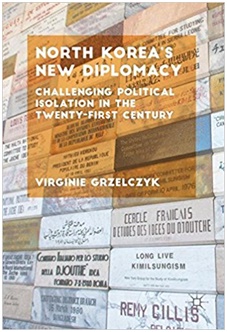 Abstract: This book examines how North Korea has managed to weather an uncertain political future and catastrophic economic system since the end of the Cold War. Emerging as a state that has successfully developed and tested missiles and nuclear weapons, North Korea has consolidated the Kim family dynasty through the appointment of Kim Jong Un as Pyongyang’s latest strongman. The author provides an empirically rich account of new diplomatic recognitions, military partnerships, knowledge trade, coping mechanisms to offset international sanctions, import and export partners, foreign investment practices and engagement within the Global South. The resulting picture is that of a state that is, against all odds, mainstreaming, and becoming a more complex and relevant actor in the 21st century diplomatic world Abstract: This book examines how North Korea has managed to weather an uncertain political future and catastrophic economic system since the end of the Cold War. Emerging as a state that has successfully developed and tested missiles and nuclear weapons, North Korea has consolidated the Kim family dynasty through the appointment of Kim Jong Un as Pyongyang’s latest strongman. The author provides an empirically rich account of new diplomatic recognitions, military partnerships, knowledge trade, coping mechanisms to offset international sanctions, import and export partners, foreign investment practices and engagement within the Global South. The resulting picture is that of a state that is, against all odds, mainstreaming, and becoming a more complex and relevant actor in the 21st century diplomatic world
| 16. The New politics of energy security in the European Union and beyond: states, markets, institutions / Prontera, Andrea - London: Routledge, 2017 |  Abstract: Combining theoretical reflections and empirical insights from paradigmatic case studies in the area of external energy governance, pipeline politics, Liquefied Natural Gas development and offshore petroleum policy and politics, this ground-breaking study demonstrates that a distinctive and new politics of energy security is definitively emerging in the European Union. Innovative not only in regard to the case studies presented (which include the Caspian region, the Baltic, Mediterrean countries, Central Asia and EU-Russia relations), but also in regard to the analytical framework adopted – an International Political Economy approach informed by an historical institutional perspective – the book challenges the common view of the ‘de-politicisation’ of energy security supported by the mainstream market approach and the power politics and ‘zero-sum game’ view supported by the geopolitical perspective. Abstract: Combining theoretical reflections and empirical insights from paradigmatic case studies in the area of external energy governance, pipeline politics, Liquefied Natural Gas development and offshore petroleum policy and politics, this ground-breaking study demonstrates that a distinctive and new politics of energy security is definitively emerging in the European Union. Innovative not only in regard to the case studies presented (which include the Caspian region, the Baltic, Mediterrean countries, Central Asia and EU-Russia relations), but also in regard to the analytical framework adopted – an International Political Economy approach informed by an historical institutional perspective – the book challenges the common view of the ‘de-politicisation’ of energy security supported by the mainstream market approach and the power politics and ‘zero-sum game’ view supported by the geopolitical perspective.
| 17. A new counterterrorism strategy: why the world failed to stop Al Qaeda and ISIS/ISIL, and how to defeat terrorist / Al-Bayati, T. Hamid - California: Praeger, 2017 | 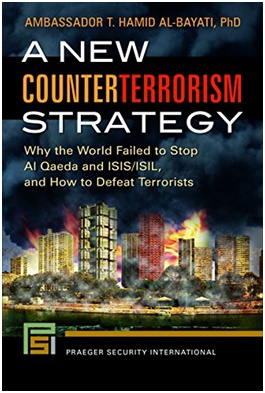 Abstract: Why is the problem of terrorism—and the emergence of more extreme and more brutal terrorist groups—one that cannot be solved, even after decades of trying? This book, authored by a United Nations Ambassador once imprisoned and tortured in Iraq, diagnoses the shortcomings of present counter-terrorism strategies and lays out an effective new plan for counterterrorism. Provides a uniquely accurate perspective on extremist terrorist groups from an author who was born and grew up in Iraq, the same culture and environment where ISIL was born, and who understands the mentality of terrorists and the way they misinterpret Islam to brainwash and recruit people, especially youth Abstract: Why is the problem of terrorism—and the emergence of more extreme and more brutal terrorist groups—one that cannot be solved, even after decades of trying? This book, authored by a United Nations Ambassador once imprisoned and tortured in Iraq, diagnoses the shortcomings of present counter-terrorism strategies and lays out an effective new plan for counterterrorism. Provides a uniquely accurate perspective on extremist terrorist groups from an author who was born and grew up in Iraq, the same culture and environment where ISIL was born, and who understands the mentality of terrorists and the way they misinterpret Islam to brainwash and recruit people, especially youth
| | 18. Origins of the North Korean garrison state: the people's army and the Korean war / Kim, Youngjun - London: Routledge, 2018 | 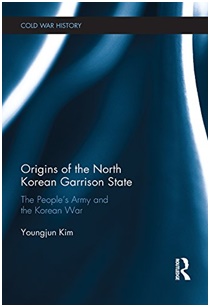 Abstract: This book investigates the origins of the North Korean garrison state by examining the development of the Korean People’s Army and the legacies of the Korean War. Despite its significance, there are very few books on the Korean People’s Army with North Korean primary sources being difficult to access. This book, however, draws on North Korean documents and North Korean veterans’ testimonies, and demonstrates how the Korean People’s Army and the Korean War shaped North Korea into a closed, militarized and xenophobic garrison state and made North Korea seek Juche (Self Reliance) ideology and weapons of mass destruction. This book maintains that the youth and lower classes in North Korea considered the Korean People’s Army as a positive opportunity for upward social mobility. Abstract: This book investigates the origins of the North Korean garrison state by examining the development of the Korean People’s Army and the legacies of the Korean War. Despite its significance, there are very few books on the Korean People’s Army with North Korean primary sources being difficult to access. This book, however, draws on North Korean documents and North Korean veterans’ testimonies, and demonstrates how the Korean People’s Army and the Korean War shaped North Korea into a closed, militarized and xenophobic garrison state and made North Korea seek Juche (Self Reliance) ideology and weapons of mass destruction. This book maintains that the youth and lower classes in North Korea considered the Korean People’s Army as a positive opportunity for upward social mobility.
| 19. The political construction of Brazil: society, economy, and state since independence / Bresser-Pereira, Luiz Carlos Luiz Carlos Bresser-Pereira - London: Lynne Rienner, 2017 |  Abstract: Spanning the period from the country’s independence in 1822 through early 2015, Luiz Carlos Bresser-Pereira assesses the trajectory of Brazil's political, social, and economic development. Bresser-Pereira draws on his decades of first-hand experience to shed light on the many paradoxes that have characterized Brazil's polity, its society, and the relations between the two across nearly two centuries. Abstract: Spanning the period from the country’s independence in 1822 through early 2015, Luiz Carlos Bresser-Pereira assesses the trajectory of Brazil's political, social, and economic development. Bresser-Pereira draws on his decades of first-hand experience to shed light on the many paradoxes that have characterized Brazil's polity, its society, and the relations between the two across nearly two centuries.
| 20. The poisoned well: empire and its legacy in the middle east / Hardy, Roger - London: Hurst &Company, 2016 |  Abstract: The conflicts and crises of today's Middle East are rooted in the colonial era. To better understand them, we need to acknowledge how Western imperialism negatively shaped the region and its destiny in the half-century between World War I and the happenings of the Cold War. That is the challenging argument of The Poisoned Well, which provides a vivid account of the struggle against European colonial rule in ten states stretching from North Africa to south Arabia. Drawing on a rich cast of eye-witnesses - ranging from nationalists and colonial administrators to soldiers, spies, and courtesans - The Poisoned Well brings to life the story of the making of the Middle East, highlighting the great dramas of decolonization such as the end of the Palestine mandate, the Suez crisis, the Algerian war of independence, and the retreat from Aden. Abstract: The conflicts and crises of today's Middle East are rooted in the colonial era. To better understand them, we need to acknowledge how Western imperialism negatively shaped the region and its destiny in the half-century between World War I and the happenings of the Cold War. That is the challenging argument of The Poisoned Well, which provides a vivid account of the struggle against European colonial rule in ten states stretching from North Africa to south Arabia. Drawing on a rich cast of eye-witnesses - ranging from nationalists and colonial administrators to soldiers, spies, and courtesans - The Poisoned Well brings to life the story of the making of the Middle East, highlighting the great dramas of decolonization such as the end of the Palestine mandate, the Suez crisis, the Algerian war of independence, and the retreat from Aden.
| 21. Political Islam in a time of revolt / Brichs, Ferran Izquierdo Ed. - New York: Palgarve Macmillan, 2017 |  Abstract: This book explores the increasing political and social prominence of Islamist groups across the Middle East in recent years. The aftermath of the 2011 uprisings saw some groups access or even control political institutions through success at the ballot box, while there has also been a marked resurgence of armed Islamist groups that have had profound effects at both the national and regional level. This volume helps us to understand the nature and development of organised political Islam over recent decades in several key Arab and Mediterranean countries: Mauritania, Morocco, Algeria, Tunisia, Libya, Egypt, Syria, Lebanon, the Palestinian Territories, and Turkey. The book identifies the central social and political Islamist actors, traces their ideological differences and similarities, and analyses power relations both within and between these organizations in the context of political instability and uncertainty. Abstract: This book explores the increasing political and social prominence of Islamist groups across the Middle East in recent years. The aftermath of the 2011 uprisings saw some groups access or even control political institutions through success at the ballot box, while there has also been a marked resurgence of armed Islamist groups that have had profound effects at both the national and regional level. This volume helps us to understand the nature and development of organised political Islam over recent decades in several key Arab and Mediterranean countries: Mauritania, Morocco, Algeria, Tunisia, Libya, Egypt, Syria, Lebanon, the Palestinian Territories, and Turkey. The book identifies the central social and political Islamist actors, traces their ideological differences and similarities, and analyses power relations both within and between these organizations in the context of political instability and uncertainty.
| 22. Political violence in ancient India / Singh, Upinder - London: Harvard University Press, 2017 | 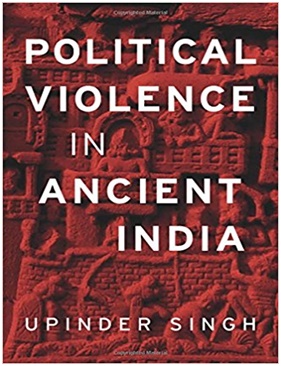 Abstract: Gandhi and Nehru helped create a myth of nonviolence in ancient India that obscures a troubled, complex heritage: a long struggle to reconcile the ethics of nonviolence with the need to use violence to rule. Upinder Singh documents the tension between violence and nonviolence in ancient Indian political thought and practice, 600 BCE to 600 CE. Abstract: Gandhi and Nehru helped create a myth of nonviolence in ancient India that obscures a troubled, complex heritage: a long struggle to reconcile the ethics of nonviolence with the need to use violence to rule. Upinder Singh documents the tension between violence and nonviolence in ancient Indian political thought and practice, 600 BCE to 600 CE.
| 23. Raj to Swaraj / Sinha, S. K. - New Delhi: Manas publication, 2017 |  Abstract: Before and after the Second World War, India had to face many challenges in getting Independence from British rule and maintaining the sovereignty, security, integrity, social upliftment and good governance of the country despite all odds. This book covers a period stretching from the heyday of the British Raj to the 'Indianisation of the empire in the late colonial period to the Independence and Partition of the country; the Nehruvian decades; wars with China and Pakistan, the Emergency years; and up to the Prime Ministership of Narendra Modi. Various revelations in the book provide a largely firsthand account of what it was like to live through some of the momentous changes that our country underwent during this period. The incidents presented here provide reflections on important historical, political, administrative landmarks and personages. Abstract: Before and after the Second World War, India had to face many challenges in getting Independence from British rule and maintaining the sovereignty, security, integrity, social upliftment and good governance of the country despite all odds. This book covers a period stretching from the heyday of the British Raj to the 'Indianisation of the empire in the late colonial period to the Independence and Partition of the country; the Nehruvian decades; wars with China and Pakistan, the Emergency years; and up to the Prime Ministership of Narendra Modi. Various revelations in the book provide a largely firsthand account of what it was like to live through some of the momentous changes that our country underwent during this period. The incidents presented here provide reflections on important historical, political, administrative landmarks and personages.
| 24. Rethinking political Islam / Hamid, Shadi Ed. and McCants, William - New York: Oxford University Press, 2017 | 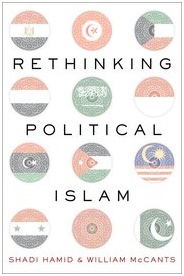 Abstract: In Rethinking Political Islam, two of the leading scholars on Islamism, Shadi Hamid and William McCants, have gathered a group of leading specialists in the field to explain how an array of Islamist movements across the Middle East and Asia have responded. Unlike ISIS and other jihadist groups that garner the most media attention, these movements have largely opted for gradual change. Their choices, however, have been reshaped by the revolutionary politics of the region. The groups depicted in the volume capture the contradictions, successes, and failures of Islamism, providing a fascinating window into a rapidly changing Middle East. It is the first book to systematically assess the evolution of mainstream Islamist groups since the Arab uprisings and the rise of ISIS, covering 12 country cases Abstract: In Rethinking Political Islam, two of the leading scholars on Islamism, Shadi Hamid and William McCants, have gathered a group of leading specialists in the field to explain how an array of Islamist movements across the Middle East and Asia have responded. Unlike ISIS and other jihadist groups that garner the most media attention, these movements have largely opted for gradual change. Their choices, however, have been reshaped by the revolutionary politics of the region. The groups depicted in the volume capture the contradictions, successes, and failures of Islamism, providing a fascinating window into a rapidly changing Middle East. It is the first book to systematically assess the evolution of mainstream Islamist groups since the Arab uprisings and the rise of ISIS, covering 12 country cases
| 25. Rethinking think tanks in contemporary China / Menegazzi, Silvia - New York: Palgarve Macmillan, 2018 |  Abstract: This book analyzes how Chinese think tanks have become essential actors in today’s Chinese foreign policy and diplomatic practices. By providing an in-depth analysis of their roles, functions and transformation in the last decade, this study explains how they differ from their Western counterparts and how they have developed during Hu Jintao’s and Xi Jinping’s mandates. Think tanks are often thought to only be able to gain access to political processes within democratic contexts. This book suggests that even in the more ambiguous Chinese political environment, think tanks remain essential actors where ideas, discourses and beliefs about foreign policy and diplomacy are generated, framed and discussed vis-à-vis China’s ascent role in international affairs and global governance Abstract: This book analyzes how Chinese think tanks have become essential actors in today’s Chinese foreign policy and diplomatic practices. By providing an in-depth analysis of their roles, functions and transformation in the last decade, this study explains how they differ from their Western counterparts and how they have developed during Hu Jintao’s and Xi Jinping’s mandates. Think tanks are often thought to only be able to gain access to political processes within democratic contexts. This book suggests that even in the more ambiguous Chinese political environment, think tanks remain essential actors where ideas, discourses and beliefs about foreign policy and diplomacy are generated, framed and discussed vis-à-vis China’s ascent role in international affairs and global governance
| 26. Rethinking Japan: the politics of contested nationalism / Stockwin, Arthur and Ampiah, Kweku - London: Lexington Books, 2017 | 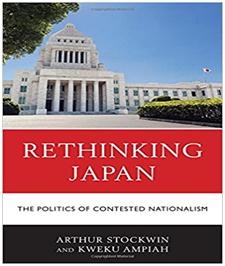 Abstract: The authors argue that with the election of the Abe Government in December 2012, Japanese politics has entered a radically new phase they describe as the “2012 Political System.” The system began with the return to power of the Liberal Democratic Party (LDP), after three years in opposition, but in a much stronger electoral position than previous LDP-based administrations in earlier decades. Moreover, with the decline of previously endemic intra-party factionalism, the LDP has united around an essentially nationalist agenda never absent from the party’s ranks, but in the past was generally blocked, or modified, by factions of more liberal persuasion. Opposition weakness following the severe defeat of the Democratic Party of Japan (DPJ) administration in 2012 has also enabled the Abe Government to establish a political stability largely lacking since the 1990s. Abstract: The authors argue that with the election of the Abe Government in December 2012, Japanese politics has entered a radically new phase they describe as the “2012 Political System.” The system began with the return to power of the Liberal Democratic Party (LDP), after three years in opposition, but in a much stronger electoral position than previous LDP-based administrations in earlier decades. Moreover, with the decline of previously endemic intra-party factionalism, the LDP has united around an essentially nationalist agenda never absent from the party’s ranks, but in the past was generally blocked, or modified, by factions of more liberal persuasion. Opposition weakness following the severe defeat of the Democratic Party of Japan (DPJ) administration in 2012 has also enabled the Abe Government to establish a political stability largely lacking since the 1990s.
| 27. Renegotiating the world order: institutional change in international relations / Lipscy, Phillip Y. - New York: Cambridge University Press, 2017 |  Abstract: Rising powers often seek to reshape the world order, triggering confrontations with those who seek to defend the status quo. In recent years, as international institutions have grown in prevalence and influence, they have increasingly become central arenas for international contestation. Phillip Y. Lipscy examines how international institutions evolve as countries seek to renegotiate the international order. He offers a new theory of institutional change and explains why some institutions change flexibly while others successfully resist or fall to the wayside. The book uses a wealth of empirical evidence - quantitative and qualitative - to evaluate the theory from international organizations such as the International Monetary Fund, World Bank, European Union, League of Nations, United Nations, the International Telecommunications Satellite Organization, and Internet Corporation for Assigned Names and Numbers Abstract: Rising powers often seek to reshape the world order, triggering confrontations with those who seek to defend the status quo. In recent years, as international institutions have grown in prevalence and influence, they have increasingly become central arenas for international contestation. Phillip Y. Lipscy examines how international institutions evolve as countries seek to renegotiate the international order. He offers a new theory of institutional change and explains why some institutions change flexibly while others successfully resist or fall to the wayside. The book uses a wealth of empirical evidence - quantitative and qualitative - to evaluate the theory from international organizations such as the International Monetary Fund, World Bank, European Union, League of Nations, United Nations, the International Telecommunications Satellite Organization, and Internet Corporation for Assigned Names and Numbers
| 28. Regional cooperation in South Asia: socio-economic, spatial, ecological and institutional aspects / Bandyopadhyay, Sumana Ed and others - Switzerland: Springer, 2017 | 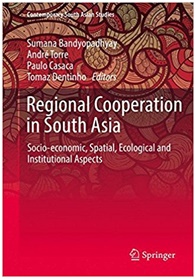 Abstract: This book highlights various challenges and opportunities for regional cooperation and development in South Asia. In light of the ongoing globalization process, the contributors investigate how socio-economic developments are changing the spatial organization of production as well as the profile of cities and landscapes, are stimulating the creation of maritime, terrestrial and aerial channels, and are putting increasing pressures on natural and environmental resources. The book is divided into four parts: The first part analyses the increasing intensity of regional trade, migration and investment flows; the second focuses on channels and adapted spaces. The third part addresses sustainability and natural resources, while the fourth highlights institutional issues. Abstract: This book highlights various challenges and opportunities for regional cooperation and development in South Asia. In light of the ongoing globalization process, the contributors investigate how socio-economic developments are changing the spatial organization of production as well as the profile of cities and landscapes, are stimulating the creation of maritime, terrestrial and aerial channels, and are putting increasing pressures on natural and environmental resources. The book is divided into four parts: The first part analyses the increasing intensity of regional trade, migration and investment flows; the second focuses on channels and adapted spaces. The third part addresses sustainability and natural resources, while the fourth highlights institutional issues.
| 29. Russian foreign policy in Eurasia: national interests and regional integration / Arakelyan. Lilia A. Lilia A. Arakelyan - London: Routledge, 2018 |  Abstract: How has Russia increased its strength and power over the last 15 years? By what means did the Kremlin bring Armenia back into its orbit? Why did Azerbaijan and Georgia try to avoid antagonizing Moscow? Can we conclude that Russia has restored its sphere of influence in Eurasia? Employing a case-centric research design this book answers these questions by analyzing Russia’s foreign affairs in the South Caucasus after the end of the Cold War. Exploring the relevance for those affairs of the creation of the Eurasian Economic Union it uses neoclassical realism and regime theories as frameworks. Arguing that Russia’s material power capabilities guide Moscow’s foreign policies in all three South Caucasian states, the author points out that Russia responds to the uncertainties of international anarchy by seeking to control its former territory and shape its external environment according to its own preferences. Abstract: How has Russia increased its strength and power over the last 15 years? By what means did the Kremlin bring Armenia back into its orbit? Why did Azerbaijan and Georgia try to avoid antagonizing Moscow? Can we conclude that Russia has restored its sphere of influence in Eurasia? Employing a case-centric research design this book answers these questions by analyzing Russia’s foreign affairs in the South Caucasus after the end of the Cold War. Exploring the relevance for those affairs of the creation of the Eurasian Economic Union it uses neoclassical realism and regime theories as frameworks. Arguing that Russia’s material power capabilities guide Moscow’s foreign policies in all three South Caucasian states, the author points out that Russia responds to the uncertainties of international anarchy by seeking to control its former territory and shape its external environment according to its own preferences.
| 30. Reconstructing China's participation in the global order / Binhong, Shao Ed. Edited by Shao Binhong - Boston: Brill Nijhoff, 2017 |  Abstract: How does China reconstruct its participation in the global order? What is the theoretical framework of global governance? What are the new challenges for China? What is China’s diplomatic strategy in the transformation of the international structure? How will China and the US evolve under ‘Two Orders’? How does China deal with the South China Sea and North Korea nuclear issues? What is the reform of RMB exchange rate regime? Will the Asian Infrastructure Investment Bank be a watershed of power transition between China and the United States in the Asia Pacific? This volume gathers a collection of translations of influential essays, speeches, and papers on Chinese foreign policy, national security, and foreign economic relations written by Chinese scholars. Abstract: How does China reconstruct its participation in the global order? What is the theoretical framework of global governance? What are the new challenges for China? What is China’s diplomatic strategy in the transformation of the international structure? How will China and the US evolve under ‘Two Orders’? How does China deal with the South China Sea and North Korea nuclear issues? What is the reform of RMB exchange rate regime? Will the Asian Infrastructure Investment Bank be a watershed of power transition between China and the United States in the Asia Pacific? This volume gathers a collection of translations of influential essays, speeches, and papers on Chinese foreign policy, national security, and foreign economic relations written by Chinese scholars.
| 31. The rise of Islamism in egypt / Arafat, Alaa Al-Din - New York: Palgarve Macmillan, 2017 | 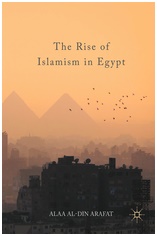 Abstract: This book provides an overview of the sudden ascendancy of Islamism in post-Mubarak Egypt and a detailed history of the power grab by the Muslim Brotherhood. The author argues that liberals and Copts are minor factions, and that the Islamists, the military and ‘couch party’ (non- politically affiliated Egyptians) are the true key actors in Egyptian politics. Additionally, it is posited that, ironically, Mubarak’s coup-proofing strategy was responsible for the military turning against him. The strained civil-military relations in Egypt are examined, as are the ideological development of the MB, Salafist and jihadist groups, and the power struggle between the Islamists and the military. Abstract: This book provides an overview of the sudden ascendancy of Islamism in post-Mubarak Egypt and a detailed history of the power grab by the Muslim Brotherhood. The author argues that liberals and Copts are minor factions, and that the Islamists, the military and ‘couch party’ (non- politically affiliated Egyptians) are the true key actors in Egyptian politics. Additionally, it is posited that, ironically, Mubarak’s coup-proofing strategy was responsible for the military turning against him. The strained civil-military relations in Egypt are examined, as are the ideological development of the MB, Salafist and jihadist groups, and the power struggle between the Islamists and the military.
| 32. Routledge handbook of Africa-Asia relations / Carvalho, Pedro Miguel Amakasu Raposo de Medeiros, Ed. - London: Routledge, 2018 | 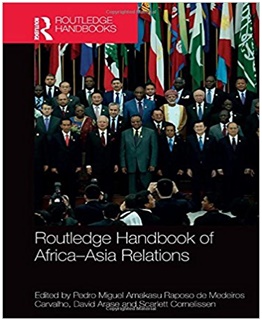 Abstract: The Routledge Handbook of Africa–Asia Relations is the first handbook aimed at studying the interactions between countries across Africa and Asia in a multi-disciplinary and comprehensive way. Providing a balanced discussion of historical and on-going processes which have both shaped and changed intercontinental relations over time, contributors take a thematic approach to examine the ways in which we can conceptualise these two very different, yet inextricably linked areas of the world. Abstract: The Routledge Handbook of Africa–Asia Relations is the first handbook aimed at studying the interactions between countries across Africa and Asia in a multi-disciplinary and comprehensive way. Providing a balanced discussion of historical and on-going processes which have both shaped and changed intercontinental relations over time, contributors take a thematic approach to examine the ways in which we can conceptualise these two very different, yet inextricably linked areas of the world.
| 33. Strategic balance in the Indo-Pacific region: challenges and prospects / Rajesh, M H Ed. Edited by M H Rajesh and Raj Kumar Sharma - Delhi: Vij Books, 2017 |  Abstract: Indo-Pacific Region is combination of Asia Pacific Region (APR) and Indian Ocean Region (IOR) connected by busy straits of Malacca, Sunda, Lombok and Makassar. The region encompasses almost half of the world population, a third of the top twenty economies, world GDP and exports. It is home to an enormously populous and diverse mix of ethnicities, cultures, political systems, religions and economies. As a confluence of two busy oceans, the region is the maritime highway of the world that combines emerging markets and resources of Asia and Africa with rest of the world. The Indo Pacific Region is the canvas of global power shift. While the US seeks to maintain a status quo in the world order and international system, China, on the other hand, asserts for recognition as a major power and strives to carve out its own sphere of influence. Abstract: Indo-Pacific Region is combination of Asia Pacific Region (APR) and Indian Ocean Region (IOR) connected by busy straits of Malacca, Sunda, Lombok and Makassar. The region encompasses almost half of the world population, a third of the top twenty economies, world GDP and exports. It is home to an enormously populous and diverse mix of ethnicities, cultures, political systems, religions and economies. As a confluence of two busy oceans, the region is the maritime highway of the world that combines emerging markets and resources of Asia and Africa with rest of the world. The Indo Pacific Region is the canvas of global power shift. While the US seeks to maintain a status quo in the world order and international system, China, on the other hand, asserts for recognition as a major power and strives to carve out its own sphere of influence.
| 34. Strategic cyber deterrence: the active cyber defense option / Jasper, Scott - London: Rowman &Littlefield, 2017 | 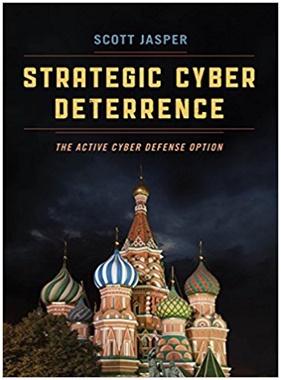 Abstract: According to the FBI, about 4000 ransomware attacks happen every day. In the United States alone, victims lost $209 million to ransomware in the first quarter of 2016. Even worse is the threat to critical infrastructure, as seen by the malware infections at electrical distribution companies in Ukraine that caused outages to 225,000 customers in late 2015. Further, recent reports on the Russian hacks into the Democratic National Committee and subsequent release of emails in a coercive campaign to apparently influence the U.S. Presidential Election have brought national attention to the inadequacy of cyber deterrence. The U.S. government seems incapable of creating an adequate strategy to alter the behavior of the wide variety of malicious actors seeking to inflict harm or damage through cyberspace. This book offers a systematic analysis of the various existing strategic cyber deterrence options and introduces the alternative strategy of active cyber defense. It examines the array of malicious actors operating in the domain, their methods of attack, and their motivations. Abstract: According to the FBI, about 4000 ransomware attacks happen every day. In the United States alone, victims lost $209 million to ransomware in the first quarter of 2016. Even worse is the threat to critical infrastructure, as seen by the malware infections at electrical distribution companies in Ukraine that caused outages to 225,000 customers in late 2015. Further, recent reports on the Russian hacks into the Democratic National Committee and subsequent release of emails in a coercive campaign to apparently influence the U.S. Presidential Election have brought national attention to the inadequacy of cyber deterrence. The U.S. government seems incapable of creating an adequate strategy to alter the behavior of the wide variety of malicious actors seeking to inflict harm or damage through cyberspace. This book offers a systematic analysis of the various existing strategic cyber deterrence options and introduces the alternative strategy of active cyber defense. It examines the array of malicious actors operating in the domain, their methods of attack, and their motivations.
| 35. The South Caucasus-security, energy and europeanization / Altunisil, Meliha B. Edited by Meliha B. Altunisil and Oktay F. Tanrisever - London: Routledge, 2018 | 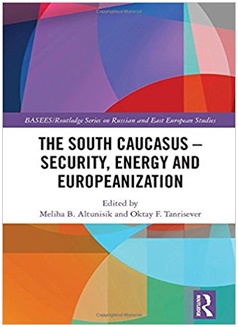 Abstract: This book explores developments in the countries of the South Caucasus – Armenia, Azerbaijan and Georgia – since the EU included the region in the European Neighbourhood Policy in 2003. It considers issues related to energy, ethnic conflict, steps towards regional integration, and, above all, security – including the involvement of Russia, Iran, Turkey and the United States. It assesses the key importance of energy, argues that the prospects for regional integration are weak, and contends that while the approach of Europe and the United States has been confused and weak, not holding out great hope of EU or NATO membership, Russia’s interest and involvement in the region is strong, and growing. Abstract: This book explores developments in the countries of the South Caucasus – Armenia, Azerbaijan and Georgia – since the EU included the region in the European Neighbourhood Policy in 2003. It considers issues related to energy, ethnic conflict, steps towards regional integration, and, above all, security – including the involvement of Russia, Iran, Turkey and the United States. It assesses the key importance of energy, argues that the prospects for regional integration are weak, and contends that while the approach of Europe and the United States has been confused and weak, not holding out great hope of EU or NATO membership, Russia’s interest and involvement in the region is strong, and growing.
| 36. The Soviet-Israeli war 1967-1973: the ussr's military intervention in the Egyptian-Israeli conflict / Ginor, Isabella and Remez, Gideon - London: Hurst &Company, 2017 |  Abstract: This book covers the peak of the USSR's direct military involvement in the Egyptian-Israeli conflict. The head-on clash between US-armed Israeli forces and some 20,000 Soviet servicemen with state-of-the-art weaponry turned the Middle East into the hottest front of the Cold War. The Soviets' success in this war of attrition paved the way for their planning and support of Egypt's cross-canal offensive in the 1973 Yom Kippur War. Ginor and Remez challenge a series of long-accepted notions as to the scope, timeline and character of the Soviet intervention and overturn the conventional view that détente with the US induced Moscow to restrainthat a US-Moscow détente led to a curtailment of Egyptian ambitions to recapture of the land it lost to Israel in 1967. Abstract: This book covers the peak of the USSR's direct military involvement in the Egyptian-Israeli conflict. The head-on clash between US-armed Israeli forces and some 20,000 Soviet servicemen with state-of-the-art weaponry turned the Middle East into the hottest front of the Cold War. The Soviets' success in this war of attrition paved the way for their planning and support of Egypt's cross-canal offensive in the 1973 Yom Kippur War. Ginor and Remez challenge a series of long-accepted notions as to the scope, timeline and character of the Soviet intervention and overturn the conventional view that détente with the US induced Moscow to restrainthat a US-Moscow détente led to a curtailment of Egyptian ambitions to recapture of the land it lost to Israel in 1967.
| 37. The Syria Jihad: the evolution of an insurgency / Lister, Charles R. - London: Hurst &Company, 2017 | 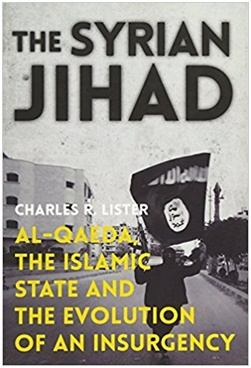 Abstract: This book assesses and explains the emergence since 2011 of Sunni jihadist organizations in Syria's fledgling insurgency, charts their evolution and situates them within the global Islamist project. Unprecedented numbers of foreign fighters have joined such groups, who will almost certainly continue to host them. Thus, external factors in their emergence are scrutinized, including the strategic and tactical lessons learned from other jihadist conflict zones and the complex interplay between Al-Qaeda and the Islamic State and how it has influenced the jihadist sphere in Syria. Abstract: This book assesses and explains the emergence since 2011 of Sunni jihadist organizations in Syria's fledgling insurgency, charts their evolution and situates them within the global Islamist project. Unprecedented numbers of foreign fighters have joined such groups, who will almost certainly continue to host them. Thus, external factors in their emergence are scrutinized, including the strategic and tactical lessons learned from other jihadist conflict zones and the complex interplay between Al-Qaeda and the Islamic State and how it has influenced the jihadist sphere in Syria.
| 38. Scorecard diplomacy: grading states to influence their reputation and behavior / Kelley, Judith G. - New York: Cambridge University Press, 2017 | 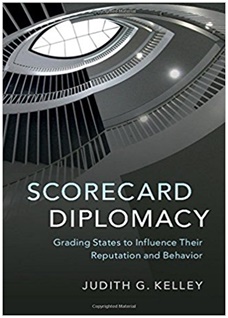 Abstract: What can the international community do when countries would rather ignore a thorny problem? Scorecard Diplomacy shows that, despite lacking traditional force, public grades are potent symbols that can evoke countries' concerns about their reputations and motivate them to address the problem. The book develops an unconventional but careful argument about the growing phenomenon of such ratings and rankings. It supports this by examining the United States' foreign policy on human trafficking using a global survey of NGOs, case studies, thousands of diplomatic cables, media stories, 90 interviews worldwide, and other documents. All of this is gathered together in a format that walks the reader through the mechanisms of scorecard diplomacy, including an assessment of the outcomes. Abstract: What can the international community do when countries would rather ignore a thorny problem? Scorecard Diplomacy shows that, despite lacking traditional force, public grades are potent symbols that can evoke countries' concerns about their reputations and motivate them to address the problem. The book develops an unconventional but careful argument about the growing phenomenon of such ratings and rankings. It supports this by examining the United States' foreign policy on human trafficking using a global survey of NGOs, case studies, thousands of diplomatic cables, media stories, 90 interviews worldwide, and other documents. All of this is gathered together in a format that walks the reader through the mechanisms of scorecard diplomacy, including an assessment of the outcomes.
| 39. Sovereignty and status in East Asian international relations / Park, Seo-Hyun - New York: Cambridge University Press, 2017 |  Abstract: This book provides a theoretical and empirical analysis of a key concept in East Asian security debates, sovereign autonomy, and how it reproduces hierarchy in the regional order. Park argues that contemporary strategic debates in East Asia are based on shared contextual knowledge - that of international hierarchy - reconstructed in the late-nineteenth century. The mechanism that reproduces this lens of hierarchy is domestic legitimacy politics in which embattled political leaders contest the meaning of sovereign autonomy. Park argues that the idea of status seeking has remained embedded in the concept of sovereign autonomy and endures through distinct and alternative security frames that continue to inform contemporary strategic debates in East Asia. Abstract: This book provides a theoretical and empirical analysis of a key concept in East Asian security debates, sovereign autonomy, and how it reproduces hierarchy in the regional order. Park argues that contemporary strategic debates in East Asia are based on shared contextual knowledge - that of international hierarchy - reconstructed in the late-nineteenth century. The mechanism that reproduces this lens of hierarchy is domestic legitimacy politics in which embattled political leaders contest the meaning of sovereign autonomy. Park argues that the idea of status seeking has remained embedded in the concept of sovereign autonomy and endures through distinct and alternative security frames that continue to inform contemporary strategic debates in East Asia.
| 40. Terrorist organizations and weapons of mass destruction: U.S threats, responses, and policies / Cook, Alethia H. - London: Rowman & Littlefield, 2017 |  Abstract: Weapons of Mass Destruction are diverse and pose unique challenges to governments attempting to keep them out of the wrong hands and preparing to respond to an attack. This text analyzes Chemical, Biological, Radiological, and Nuclear (CBRN) weapons and terrorist groups with a known interest in them. It presents accessible information about the technical challenges posed by each type of weapon, assesses the threats, and reviews the US governmental responses. It provides structured CBRN case studies and allows for easy comparison of threats, challenges, and responses. The text combines weapons and policy information in one comprehensive and comparative resource for researchers and students interested in key issues in modern terrorism and international security. Abstract: Weapons of Mass Destruction are diverse and pose unique challenges to governments attempting to keep them out of the wrong hands and preparing to respond to an attack. This text analyzes Chemical, Biological, Radiological, and Nuclear (CBRN) weapons and terrorist groups with a known interest in them. It presents accessible information about the technical challenges posed by each type of weapon, assesses the threats, and reviews the US governmental responses. It provides structured CBRN case studies and allows for easy comparison of threats, challenges, and responses. The text combines weapons and policy information in one comprehensive and comparative resource for researchers and students interested in key issues in modern terrorism and international security.
| 41. Turkey's relations with the middle east: political encounters after the Arab spring / Isiksal, Huseyin Ed. Edited by Huseyin Isiksal and Goksel, Oguzhan - London: Springer, 2018 |  Abstract: This volume examines contemporary political relations between Turkey and the Middle East. In the light of the Arab Uprisings of 2011, the Syria Crisis, the escalation of regional terrorism and the military coup attempt in Turkey, it illustrates the dramatic fluctuations in Turkish foreign policy towards key Middle Eastern countries, such as Iran, Saudi Arabia, Egypt, Syria and Iraq. The contributors analyze Turkey’s deepening involvement in Middle Eastern regional affairs, also addressing issues such as terrorism, social and political movements and minority rights struggles. Abstract: This volume examines contemporary political relations between Turkey and the Middle East. In the light of the Arab Uprisings of 2011, the Syria Crisis, the escalation of regional terrorism and the military coup attempt in Turkey, it illustrates the dramatic fluctuations in Turkish foreign policy towards key Middle Eastern countries, such as Iran, Saudi Arabia, Egypt, Syria and Iraq. The contributors analyze Turkey’s deepening involvement in Middle Eastern regional affairs, also addressing issues such as terrorism, social and political movements and minority rights struggles.
| | 42. The trade game: engaging with central Asia / Chandra, Amiya - New Delhi: Pentagon Press, 2017 |  Abstract: This book is a revised extension of the previous edition, India-Central Asia Relations: The Economic Dimension, and delves deeper into the complex and intricate geopolitical, security and economic relationship of India with Central Asia. India considers Central Asia as its "extended neighbourhood", and has taken various initiatives like "Connect Central Asia" and full membership of Shanghai Cooperation Organisation (SCO), and views Central Asian Republics (CARs) as an answer to India's multiple objectives: (a) to maintain its political influence in the region; (b) fulfil India's energy requirements; (c) to develop a meaningful economic and trade relationship; and (d) contribute in CARs development by expanding its bouquet of goods and services exports in areas where they benefit mutually. Abstract: This book is a revised extension of the previous edition, India-Central Asia Relations: The Economic Dimension, and delves deeper into the complex and intricate geopolitical, security and economic relationship of India with Central Asia. India considers Central Asia as its "extended neighbourhood", and has taken various initiatives like "Connect Central Asia" and full membership of Shanghai Cooperation Organisation (SCO), and views Central Asian Republics (CARs) as an answer to India's multiple objectives: (a) to maintain its political influence in the region; (b) fulfil India's energy requirements; (c) to develop a meaningful economic and trade relationship; and (d) contribute in CARs development by expanding its bouquet of goods and services exports in areas where they benefit mutually.
| 43. Triangular diplomacy among the, united sates, the European union, and the Russian federation: responses to the crisis in ukraine / Birchfield, Vicki L. Ed. and Young, Alasdair R. - New York: Palgrave Macmiilan, 2018 |  Abstract: This book examines the crisis in Ukraine through the lens of “triangular diplomacy,” which focuses on the multiple interactions among the European Union, the United States and Russia. It is explicitly comparative, considering how the US and EU responded to ostensibly the same crisis. It also adopts a “360-degree” perspective, focusing on how the US and EU interacted in their dealings with Russia, and how Russia and Ukraine have responded. Chapters focus on each of the four protagonists – the EU, the US, Russia and Ukraine – and on key, cross-cutting aspects of the crisis – sanctions, international law and energy. The book thus contrasts a conventional, if exceptional, great power – the US – with a very non-traditional foreign policy actor – the EU. It would be suitable for both undergraduate and graduate courses on the EU’s external policies and engagement in world affairs, EU-US relations, EU-Russia interactions, or regional security issues. Abstract: This book examines the crisis in Ukraine through the lens of “triangular diplomacy,” which focuses on the multiple interactions among the European Union, the United States and Russia. It is explicitly comparative, considering how the US and EU responded to ostensibly the same crisis. It also adopts a “360-degree” perspective, focusing on how the US and EU interacted in their dealings with Russia, and how Russia and Ukraine have responded. Chapters focus on each of the four protagonists – the EU, the US, Russia and Ukraine – and on key, cross-cutting aspects of the crisis – sanctions, international law and energy. The book thus contrasts a conventional, if exceptional, great power – the US – with a very non-traditional foreign policy actor – the EU. It would be suitable for both undergraduate and graduate courses on the EU’s external policies and engagement in world affairs, EU-US relations, EU-Russia interactions, or regional security issues.
| 44. Tibet: the last months of a free nation: India Tibet relations 1947-1962 / Arpi, Claude - Delhi: Vij Books, 2017 | 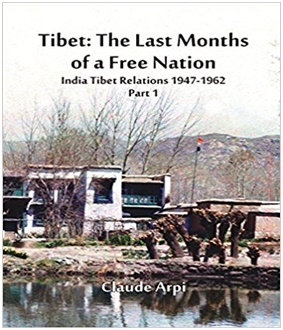 Abstract: Though Tibet's system of governance had serious lacunas, the Land of Snows was free and independent. In October 1950, Mao's regime decided to ‘liberate' it. ‘Liberate' from what, was the question everybody asked. Though some in Delhi did not realise it, it would soon be a tragedy for India too, as it had to suddenly live with a new neighbor, whose ideology was the opposite of Buddhist values. The narrative starts soon after Independence and ends with the signing of the 17-Point Agreement in Beijing in May 1951 when Tibet lost its Independence …and India, a gentle neighbour. Abstract: Though Tibet's system of governance had serious lacunas, the Land of Snows was free and independent. In October 1950, Mao's regime decided to ‘liberate' it. ‘Liberate' from what, was the question everybody asked. Though some in Delhi did not realise it, it would soon be a tragedy for India too, as it had to suddenly live with a new neighbor, whose ideology was the opposite of Buddhist values. The narrative starts soon after Independence and ends with the signing of the 17-Point Agreement in Beijing in May 1951 when Tibet lost its Independence …and India, a gentle neighbour.
| 45. Uzbekistan's foreign policy: the struggle for recognition and self-reliance under karimov / Fazendeiro, Bernardo Teles - London: Routledge, 2018 |  Abstract: Uzbekistan’s foreign policy from 1991 to 2016, starting from independence right up to the death of its first president, Islam Karimov, is one of the more distinctive approaches to international politics since the end of the Cold War. This distinctiveness rests on the republic’s gradual struggle for self-reliance upon becoming independent. Authorities in Uzbekistan, especially its President, were sceptics of the norms that came to prevail across regional and broader international politics. This book addresses the making of Uzbekistan’s general foreign policy and its corresponding effects outside Central Asia, particularly at the highest level, among state officials, heads of state and ministers. Abstract: Uzbekistan’s foreign policy from 1991 to 2016, starting from independence right up to the death of its first president, Islam Karimov, is one of the more distinctive approaches to international politics since the end of the Cold War. This distinctiveness rests on the republic’s gradual struggle for self-reliance upon becoming independent. Authorities in Uzbekistan, especially its President, were sceptics of the norms that came to prevail across regional and broader international politics. This book addresses the making of Uzbekistan’s general foreign policy and its corresponding effects outside Central Asia, particularly at the highest level, among state officials, heads of state and ministers.
| | 46. Water conflict in northeast India / Joy, K. J. Ed. - London: Routledge, 2018 | 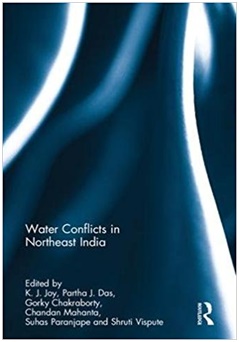 Abstract: This volume documents the multifaceted conflicts and contestations around water in Northeast India, analyses their causes and consequences, and includes expert recommendations. It fills a major gap in the subject by examining wide-ranging issues such as cultural and anthropological dimensions of damming rivers in the Northeast and Eastern Himalayas; seismic surveys, oil extractions, and water conflicts; discontent over water quality and drinking water; floods, river bank erosion, embankments; water policy; transboundary water conflicts; and hydropower development. It also discusses the alleged Chinese efforts to divert the Brahmaputra River. With its analytical and comprehensive coverage, 18 case studies, and suggested approaches for conflict resolution, this book will be indispensable for scholars and researchers of development studies, governance and public policy, politics and international relations, water resources, environment, geography, climate change, area studies, economics, and sociology Abstract: This volume documents the multifaceted conflicts and contestations around water in Northeast India, analyses their causes and consequences, and includes expert recommendations. It fills a major gap in the subject by examining wide-ranging issues such as cultural and anthropological dimensions of damming rivers in the Northeast and Eastern Himalayas; seismic surveys, oil extractions, and water conflicts; discontent over water quality and drinking water; floods, river bank erosion, embankments; water policy; transboundary water conflicts; and hydropower development. It also discusses the alleged Chinese efforts to divert the Brahmaputra River. With its analytical and comprehensive coverage, 18 case studies, and suggested approaches for conflict resolution, this book will be indispensable for scholars and researchers of development studies, governance and public policy, politics and international relations, water resources, environment, geography, climate change, area studies, economics, and sociology
| 47. Water governance and collective action: multi-scale challenges / Suhardiman, Diana Ed. - London: Routledge, 2017 | 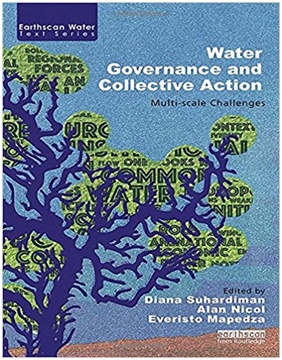 Abstract: The case studies link community-based management of water resources with national decision-making landscapes, transboundary water governance, and global policy discussion on sustainable development, justice and water security. Power and politics are placed at the centre of collective action and water governance discourse, while addressing three core questions: how is collective action shaped by existing power structures and relationships at different scales? What are the kinds of tools and approaches that various actors can take and adopt towards more deliberative processes for collective action? And what are the anticipated outcomes for development processes, the environment and the global resource base of achieving collective action across scales? Abstract: The case studies link community-based management of water resources with national decision-making landscapes, transboundary water governance, and global policy discussion on sustainable development, justice and water security. Power and politics are placed at the centre of collective action and water governance discourse, while addressing three core questions: how is collective action shaped by existing power structures and relationships at different scales? What are the kinds of tools and approaches that various actors can take and adopt towards more deliberative processes for collective action? And what are the anticipated outcomes for development processes, the environment and the global resource base of achieving collective action across scales?
| 48. Water resource management: sustainability in an era of climate change / Mcnabb, David E. - New York: Palgarve Macmillan, 2017 |  Abstract: This book is about how water managers in the United States are responding to the call for increased effort to achieve sustainable supplies of clean fresh water for present and future generations. The author, himself a participant in the water supply chain, demonstrates that while water is indeed one of life’s most essential commodities, in many parts of the United States it is one of the most stressed resources. Throughout the book the author illustrates both the good and the bad efforts taken or not taken by water and wastewater management with real life examples. This book will appeal to the educators, students, volunteers, elected officials, regulators, and other participants with a role in helping the suppliers of water and wastewater services to achieve their goals providing clean, safe water on a sustainable basis. Abstract: This book is about how water managers in the United States are responding to the call for increased effort to achieve sustainable supplies of clean fresh water for present and future generations. The author, himself a participant in the water supply chain, demonstrates that while water is indeed one of life’s most essential commodities, in many parts of the United States it is one of the most stressed resources. Throughout the book the author illustrates both the good and the bad efforts taken or not taken by water and wastewater management with real life examples. This book will appeal to the educators, students, volunteers, elected officials, regulators, and other participants with a role in helping the suppliers of water and wastewater services to achieve their goals providing clean, safe water on a sustainable basis.
| 49. Yemen in crisis: authocracy, neo-liberalism and disintegration of a state / Lackner, Helen - London: Saqi, 2017 |  Abstract: Yemen is in the grip of its most severe crisis in years. Fuelled by Arab and Western intervention, the civil war has quickly escalated, resulting in thousands killed and millions close to starvation. Suffering from a collapsed economy, the people of Yemen face a desperate choice between the Huthi rebels allied with ex-President Saleh on the one side and the internationally recognised government propped up by the Saudi-led coalition and Western arms on the other. The struggle for power in the Arab world’s poorest but strategically vital nation has serious implications for the region and beyond. While Saudi Arabia and its allies fear that a Huthi takeover would threaten free passage of oil through the Bab al-Mandab Strait, Western governments fear an increase of attacks from al-Qa‘ida in the absence of effective governance. Abstract: Yemen is in the grip of its most severe crisis in years. Fuelled by Arab and Western intervention, the civil war has quickly escalated, resulting in thousands killed and millions close to starvation. Suffering from a collapsed economy, the people of Yemen face a desperate choice between the Huthi rebels allied with ex-President Saleh on the one side and the internationally recognised government propped up by the Saudi-led coalition and Western arms on the other. The struggle for power in the Arab world’s poorest but strategically vital nation has serious implications for the region and beyond. While Saudi Arabia and its allies fear that a Huthi takeover would threaten free passage of oil through the Bab al-Mandab Strait, Western governments fear an increase of attacks from al-Qa‘ida in the absence of effective governance.
| | 50. Jumpstarting South Asia: revisiting economic reforms and look east policies / Rana, Pradumna B. and Chia, Wai-Mun - New York: Oxford University Press, 2018 |  Abstract: Economic reforms implemented by the South Asian countries in the 1980s and 1990s had positive impacts on growth, and the region's share of world GDP had started to increase. But, more recently, economic growth in South Asia has softened somewhat due to a number of reasons. This book focuses on the slowing pace of economic reforms and makes the case for a two-pronged strategy to jumpstart South Asian economies. First, South Asian countries should complete the economic reform process that they had begun and implement the more microeconomic reforms, namely, the sectoral, and governance and institutional reforms to enhance competition and improve the operation of markets. Second, they should implement the second round of 'Look East' policies or LEP2 to (i) link themselves to production networks in East Asia, their fastest growing markets, and (ii) develop production networks in manufacturing and services within their region. Abstract: Economic reforms implemented by the South Asian countries in the 1980s and 1990s had positive impacts on growth, and the region's share of world GDP had started to increase. But, more recently, economic growth in South Asia has softened somewhat due to a number of reasons. This book focuses on the slowing pace of economic reforms and makes the case for a two-pronged strategy to jumpstart South Asian economies. First, South Asian countries should complete the economic reform process that they had begun and implement the more microeconomic reforms, namely, the sectoral, and governance and institutional reforms to enhance competition and improve the operation of markets. Second, they should implement the second round of 'Look East' policies or LEP2 to (i) link themselves to production networks in East Asia, their fastest growing markets, and (ii) develop production networks in manufacturing and services within their region.
|
|
|
| |
|
|
|
|
|
|